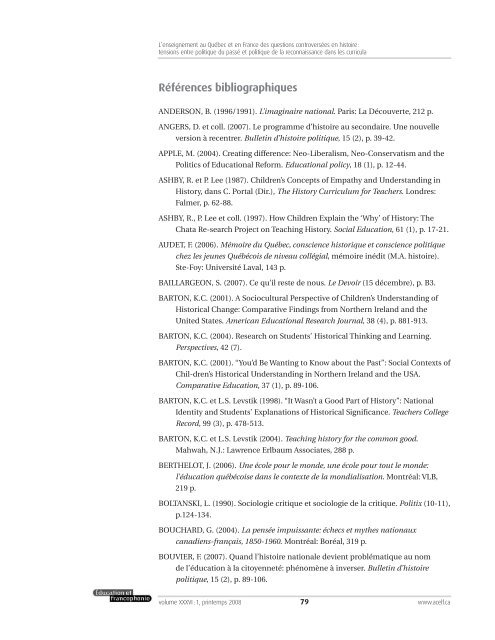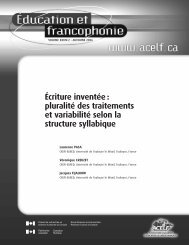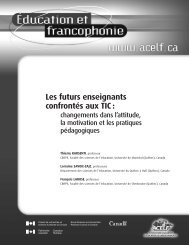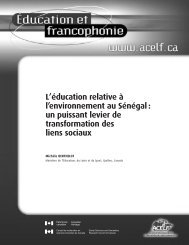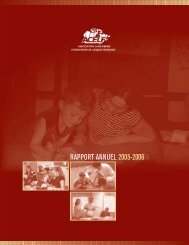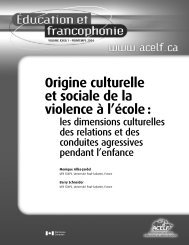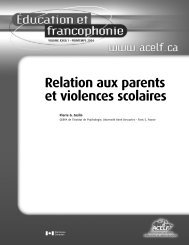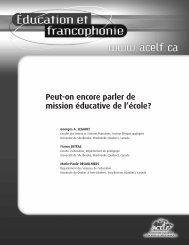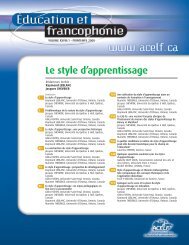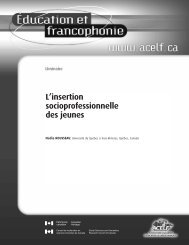L’enseignement au Québec et en France des questions controversées en histoire :tensions entre politique du passé et politique de la reconnaissance dans les curricula« communauté affective », associée au retour appréhendé du communautarismenostalgique replié sur la sauvegarde de valeurs particulières et indiscutables.Dans les deux cas, des tensions existent entre des logiques universalistes, lesouci de la cohésion sociale établie sur une stabilité du récit historique et le développementdu sens critique qui tend à déconstruire, à relativiser. Ces tensions traversentaussi bien le curriculum prescrit que réel.Dans les deux pays, une certaine méfiance se manifeste à l’égard d’une logiquecommunautarienne trop affirmée qui ruinerait la cohésion du groupe. Cette méfianceest ancienne pour la France, plus récente pour le Québec. Les modèles héritéstendent ainsi à se rapprocher au-delà de leurs différences, sous la forme de modèlespassablement composites.ConclusionL’étude de l’enseignement des questions controversées en histoire en France etau Québec montre que la politique du passé prend de nouvelles formes entraînantd’éventuelles tensions. L’exemple de ces deux pays souligne le fait que la politique dela reconnaissance est finalement une des modalités, plus récente, d’une politique dupassé soucieuse de préserver la paix sociale et la coexistence de populations qui ontdes histoires différentes. La préoccupation du maintien d’un récit commun est fortedans les deux pays, ce qui rend difficile le traitement des questions controverséesavec l’objectif de développer la réflexivité des élèves et leur esprit critique. Les enseignantssont confrontés à des injonctions et à des logiques contradictoires dans leconcret de l’activité. En fait, cela rappelle les conclusions à la fois de Barton et Levtik(2004, p. 259-260) et de VanHover et Yeager (2007, p. 686-688): en général, les interventionsdes enseignants qui croient que l’histoire doit servir de véhicule pour promouvoirleurs valeurs (y compris des principes démocratiques) et réprimer les autres(y compris des principes antidémocratiques) servent surtout à communiquer lecontenu notionnel et à contrôler les comportements des élèves, tandis que ceux quipensent plutôt leur pratique en termes de participation des élèves en classe et derespect du pluralisme tendent à poser plus de gestes qui visent explicitement àdévelopper l’autonomie intellectuelle et les habiletés intellectuelles.Il serait sans doute utile, à cet égard, que les prescriptions élucident les choix(historiographiques et axiologiques, entre autres) faits en amont et que les enseignantsbénéficient de ressources (documentaires, de formation) leur permettantd’élucider les enjeux de l’enseignement de questions controversées et d’échanger surle « comment faire » face à des contenus souvent non stabilisés et des élèves particulièrement« réceptifs ». Cela met en jeu la pratique du métier et son éthique, deuxéléments qui nécessitent du collectif pour être pensés et pour forger des points derepère mobilisés ensuite dans l’action.volume XXXVI:1, printemps 200878www.<strong>acelf</strong>.ca
L’enseignement au Québec et en France des questions controversées en histoire :tensions entre politique du passé et politique de la reconnaissance dans les curriculaRéférences bibliographiquesANDERSON, B. (1996/1991). L’imaginaire national. Paris: La Découverte, 212 p.ANGERS, D. et coll. (2007). Le programme d’histoire au secondaire. Une nouvelleversion à recentrer. Bulletin d’histoire politique, 15 (2), p. 39-42.APPLE, M. (2004). Creating difference: Neo-Liberalism, Neo-Conservatism and thePolitics of Educational Reform. Educational policy, 18 (1), p. 12-44.ASHBY, R. et P. Lee (1987). Children’s Concepts of Empathy and Understanding inHistory, dans C. Portal (Dir.), The History Curriculum for Teachers. Londres:Falmer, p. 62-88.ASHBY, R., P. Lee et coll. (1997). How Children Explain the ‘Why’ of History: TheChata Re-search Project on Teaching History. Social Education, 61 (1), p. 17-21.AUDET, F. (2006). Mémoire du Québec, conscience historique et conscience politiquechez les jeunes Québécois de niveau collégial, mémoire inédit (M.A. histoire).Ste-Foy: Université Laval, 143 p.BAILLARGEON, S. (2007). Ce qu’il reste de nous. Le Devoir (15 décembre), p. B3.BARTON, K.C. (2001). A Sociocultural Perspective of Children’s Understanding ofHistorical Change: Comparative Findings from Northern Ireland and theUnited States. American Educational Research Journal, 38 (4), p. 881-913.BARTON, K.C. (2004). Research on Students’ Historical Thinking and Learning.Perspectives, 42 (7).BARTON, K.C. (2001). “You’d Be Wanting to Know about the Past”: Social Contexts ofChil-dren’s Historical Understanding in Northern Ireland and the USA.Comparative Education, 37 (1), p. 89-106.BARTON, K.C. et L.S. Levstik (1998). “It Wasn’t a Good Part of History”: NationalIdentity and Students’ Explanations of Historical Significance. Teachers CollegeRecord, 99 (3), p. 478-513.BARTON, K.C. et L.S. Levstik (2004). Teaching history for the common good.Mahwah, N.J.: Lawrence Erlbaum Associates, 288 p.BERTHELOT, J. (2006). Une école pour le monde, une école pour tout le monde:l’éducation québécoise dans le contexte de la mondialisation. Montréal: VLB,219 p.BOLTANSKI, L. (1990). Sociologie critique et sociologie de la critique. Politix (10-11),p.124-134.BOUCHARD, G. (2004). La pensée impuissante: échecs et mythes nationauxcanadiens-français, 1850-1960. Montréal: Boréal, 319 p.BOUVIER, F. (2007). Quand l’histoire nationale devient problématique au nomde l’éducation à la citoyenneté: phénomène à inverser. Bulletin d’histoirepolitique, 15 (2), p. 89-106.volume XXXVI:1, printemps 200879www.<strong>acelf</strong>.ca
- Page 4:
Rapports ethniques et éducation :
- Page 7 and 8:
Les relations entrecommunautés lin
- Page 9 and 10:
Les relations entre communautés li
- Page 11 and 12:
Les relations entre communautés li
- Page 13 and 14:
Les relations entre communautés li
- Page 15 and 16:
Les relations entre communautés li
- Page 17 and 18:
Les relations entre communautés li
- Page 19 and 20:
Les relations entre communautés li
- Page 21 and 22:
Les relations entre communautés li
- Page 23 and 24:
Les relations entre communautés li
- Page 25 and 26:
Les relations entre communautés li
- Page 27 and 28:
Regards croisés sur l’inclusiond
- Page 29 and 30: Regards croisés sur l’inclusion
- Page 31 and 32: Regards croisés sur l’inclusion
- Page 33 and 34: Regards croisés sur l’inclusion
- Page 35 and 36: Regards croisés sur l’inclusion
- Page 37 and 38: Regards croisés sur l’inclusion
- Page 39 and 40: Regards croisés sur l’inclusion
- Page 41 and 42: Regards croisés sur l’inclusion
- Page 43 and 44: Regards croisés sur l’inclusion
- Page 45 and 46: Regards croisés sur l’inclusion
- Page 47 and 48: La dimension linguistique des enjeu
- Page 49 and 50: La dimension linguistique des enjeu
- Page 51 and 52: La dimension linguistique des enjeu
- Page 53 and 54: La dimension linguistique des enjeu
- Page 55 and 56: La dimension linguistique des enjeu
- Page 57 and 58: La dimension linguistique des enjeu
- Page 59 and 60: La dimension linguistique des enjeu
- Page 61 and 62: La dimension linguistique des enjeu
- Page 63 and 64: La dimension linguistique des enjeu
- Page 65 and 66: La dimension linguistique des enjeu
- Page 67 and 68: L’enseignement au Québecet en Fr
- Page 69 and 70: L’enseignement au Québec et en F
- Page 71 and 72: L’enseignement au Québec et en F
- Page 73 and 74: L’enseignement au Québec et en F
- Page 75 and 76: L’enseignement au Québec et en F
- Page 77 and 78: L’enseignement au Québec et en F
- Page 79: L’enseignement au Québec et en F
- Page 83 and 84: L’enseignement au Québec et en F
- Page 85 and 86: L’enseignement au Québec et en F
- Page 87 and 88: L’enseignement au Québec et en F
- Page 89 and 90: La prise en compte de la diversité
- Page 91 and 92: La prise en compte de la diversité
- Page 93 and 94: La prise en compte de la diversité
- Page 95 and 96: La prise en compte de la diversité
- Page 97 and 98: La prise en compte de la diversité
- Page 99 and 100: La prise en compte de la diversité
- Page 101 and 102: La prise en compte de la diversité
- Page 103 and 104: La prise en compte de la diversité
- Page 105 and 106: L’éducation à la citoyennetéda
- Page 107 and 108: L’éducation à la citoyenneté d
- Page 109 and 110: L’éducation à la citoyenneté d
- Page 111 and 112: L’éducation à la citoyenneté d
- Page 113 and 114: L’éducation à la citoyenneté d
- Page 115 and 116: L’éducation à la citoyenneté d
- Page 117 and 118: L’éducation à la citoyenneté d
- Page 119 and 120: L’éducation à la citoyenneté d
- Page 121 and 122: L’éducation à la citoyenneté d
- Page 123 and 124: L’éducation à la citoyenneté d
- Page 125 and 126: Diversité culturelle,enseignement
- Page 127 and 128: Diversité culturelle, enseignement
- Page 129 and 130: Diversité culturelle, enseignement
- Page 131 and 132:
Diversité culturelle, enseignement
- Page 133 and 134:
Diversité culturelle, enseignement
- Page 135 and 136:
Diversité culturelle, enseignement
- Page 137 and 138:
Diversité culturelle, enseignement
- Page 139 and 140:
Diversité culturelle, enseignement
- Page 141 and 142:
Diversité culturelle, enseignement
- Page 143 and 144:
Diversité culturelle, enseignement
- Page 145 and 146:
Relever le défi de la diversité :
- Page 147 and 148:
Relever le défi de la diversité :
- Page 149 and 150:
Relever le défi de la diversité :
- Page 151 and 152:
Relever le défi de la diversité :
- Page 153 and 154:
Relever le défi de la diversité :
- Page 155 and 156:
Relever le défi de la diversité :
- Page 157 and 158:
Relever le défi de la diversité :
- Page 159 and 160:
Relever le défi de la diversité :
- Page 161 and 162:
Relever le défi de la diversité :
- Page 163 and 164:
Les relations école - famillesimmi
- Page 165 and 166:
Les relations école - familles imm
- Page 167 and 168:
Les relations école - familles imm
- Page 169 and 170:
Les relations école - familles imm
- Page 171 and 172:
Les relations école - familles imm
- Page 173 and 174:
Les relations école - familles imm
- Page 175 and 176:
Les relations école - familles imm
- Page 177 and 178:
Les relations école - familles imm
- Page 179 and 180:
La réussite scolaire desélèves i
- Page 181 and 182:
La réussite scolaire des élèves
- Page 183 and 184:
La réussite scolaire des élèves
- Page 185 and 186:
La réussite scolaire des élèves
- Page 187 and 188:
La réussite scolaire des élèves
- Page 189 and 190:
La réussite scolaire des élèves
- Page 191 and 192:
La réussite scolaire des élèves
- Page 193 and 194:
La réussite scolaire des élèves
- Page 195 and 196:
La réussite scolaire des élèves
- Page 197 and 198:
La réussite scolaire des élèves
- Page 199 and 200:
La « valeur ajoutée »de l’édu
- Page 201 and 202:
La « valeur ajoutée » de l’éd
- Page 203 and 204:
La « valeur ajoutée » de l’éd
- Page 205 and 206:
La « valeur ajoutée » de l’éd
- Page 207 and 208:
La « valeur ajoutée » de l’éd
- Page 209 and 210:
La « valeur ajoutée » de l’éd
- Page 211 and 212:
La « valeur ajoutée » de l’éd
- Page 213 and 214:
La « valeur ajoutée » de l’éd
- Page 215 and 216:
La « valeur ajoutée » de l’éd
- Page 217 and 218:
La « valeur ajoutée » de l’éd


